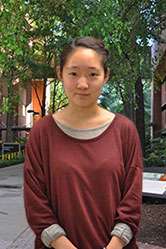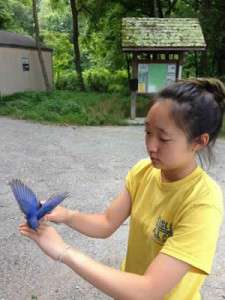Major: Biological Sciences
“Using Geolocators to Track Migratory Pathways in Baltimore Orioles”

Migration is the regular seasonal movement of individuals, usually between breeding and non-breeding grounds. This phenomenon is observed across a wide range of animal groups, from fish and insects to mammals and birds. Due to their large scale journey and size, it has been difficult to track individual populations of small song birds. However with the innovation of light-weight tracking devices, it is possible to track the routes as well as the wintering locations of individual birds. These tracking devices, known as geolocators, use light levels and sunrise/sunset times to determine the location of the bird; the length of daylight corresponds to latitude whereas specific dawn/dusk times correspond to longitude. Using decoy models and recorded male songs, we mimicked a territorial intrusion to lure birds into our nets. We used a harness to attach the geolocators onto six Baltimore Orioles in various parks in Maryland from April-July 2013. The geolocators will constantly store data points until we recapture the returning birds in the following spring to remove geolocators, download and analyze the data. New geolocators will be placed on eight Baltimore Oriole males and females in late April to June 2014. This information will be essential in studying patterns in migrational movement and timing which is important for both basic understanding of animal behavior and the conservation of our state bird and other orioles. 
How did you find your mentor for your research?
My mentor taught Intro to Ecology and Evolution my freshmen year. The class was interesting and I wanted a more hands-on experience in STEM, so I looked up his research interests and scheduled meetings to learn more.
How did you know this was the project you wanted to do?
I’ve always been fascinated by field biology and ecology; Animal Planet and National Geographic were my favorite childhood TV channels. I also enjoy being out in nature and hiking, so when I heard about the opportunity to study live specimens in their natural habitat, I immediately got excited. I knew this project was a clear fit for me because I would gain experience in handling birds in both laboratory and field settings.
Is this your first independent research?
Yes. Before college I had never participated in scientific research before.
Do you get course credit for this work?
Yes, I get research credit equal to the amount of hours per week I work in the lab.
How much time do you put into it?
I started this project at the end of my freshman year. I worked summer 2013 when the project first began and this is my second summer on the project. During the academic year I am in the lab from 8-12 hours a week.
How did you hear about the Undergraduate Research Award (URA) program?
Many researchers at URCAD were URA scholars. Also one of my undergraduate lab mates was in the program.
Was the application difficult to do?
Not at all, but it is important to be organized and timely with all the documents and requirements.
What has been the hardest part about your research?
Sometimes research does not go according to plan. Due to studying orioles out in the field, we run into bumps in the road, such as weather or sample size. Also, depending on the time of year, Baltimore and Orchard orioles are hard to find, or are wintering in Central America. Therefore, organization and planning ahead of time is important, but being flexible and being able to adapt to the changing situation is even more crucial.
How does your research relate to your work in other classes?
A lot! I learned about evolutionary history, gel electrophoresis, PCR amplification and much more. It’s really cool because in biology classes I read about these processes, but in the lab I’m actually incorporating all these skills to solve a scientific question. Seeing the real life applications really helps reinforce the concepts you learn in class.
What else are you involved in on campus?
I am a Meyerhoff Scholar and UBM (Interdisciplinary Training for Undergraduates in Biological Sciences and Mathematics) scholar. I also am a member of the Alpha Kappa Delta Phi Sorority on campus and a UMBC Admissions Ambassador.
What is your advice to other students about getting involved in research?
Find something that truly interests you and don’t be afraid to pursue it. It can be difficult getting into a lab initially (a lot of my emails went unanswered) but, it is possible and rewarding!
What are your career goals?
I plan on applying to medical school and maybe working in a research lab with biomedical interests.
7/21/2014